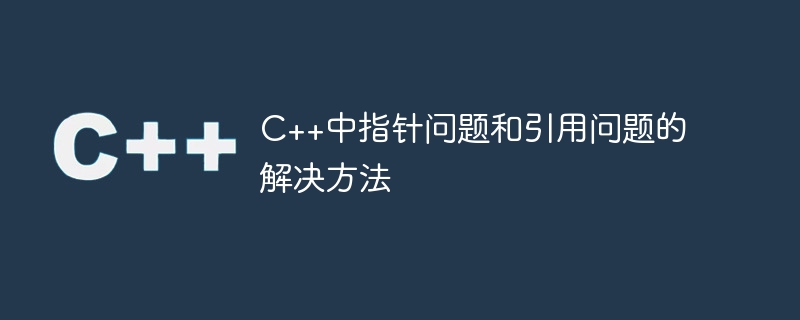

Solutions to pointer problems and reference problems in C
Introduction:
In the process of C programming, pointer problems and reference problems are common problems that trouble programmers difficult problem. This article will introduce some methods to solve these problems and illustrate them through specific code examples to help readers better understand and apply them.
1. Solution to the pointer problem
int main()
{
int* ptr = nullptr; // 初始化为nullptr
if (ptr != nullptr) // 空指针检测
{
*ptr = 10; // 使用指针前先进行检测
}
return 0;
}2. Solution to the reference problem
int main()
{
int a = 10;
int& ref = a; // 引用初始化为a
int& ref2; // 错误,引用必须进行初始化
return 0;
}void swap(int& a, int& b)
{
int temp = a;
a = b;
b = temp;
}
int main()
{
int x = 10, y = 20;
swap(x, y); // 使用引用作为函数参数进行值的交换
return 0;
}& and * operators for conversion. The following is a sample code: int main()
{
int a = 10;
int* ptr = &a; // 将a的地址赋给指针ptr
int& ref = *ptr; // 将指针ptr所指向的值赋给引用ref
return 0;
}Conclusion:
Pointer problems and reference problems are common problems in the C programming process. Pointer problems can be effectively solved by performing null pointer detection and avoiding wild pointers and memory leaks. Reference problems can be solved by properly initializing references, using references as function parameters, and converting references to pointers. I hope this article will be helpful to readers when solving pointer problems and reference problems in C, and will deepen their understanding of these problems.
The above is the detailed content of Solutions to pointer and reference problems in C++. For more information, please follow other related articles on the PHP Chinese website!
 The meaning of today's headline display volume
The meaning of today's headline display volume
 MySQL's storage engine for modifying data tables
MySQL's storage engine for modifying data tables
 python configure environment variables
python configure environment variables
 How to convert pdg files to pdf
How to convert pdg files to pdf
 Thunder 7 crack patch
Thunder 7 crack patch
 What should I do if I can only send one private message on TikTok?
What should I do if I can only send one private message on TikTok?
 xrp Ripple Latest News
xrp Ripple Latest News
 How to use scannow command
How to use scannow command




